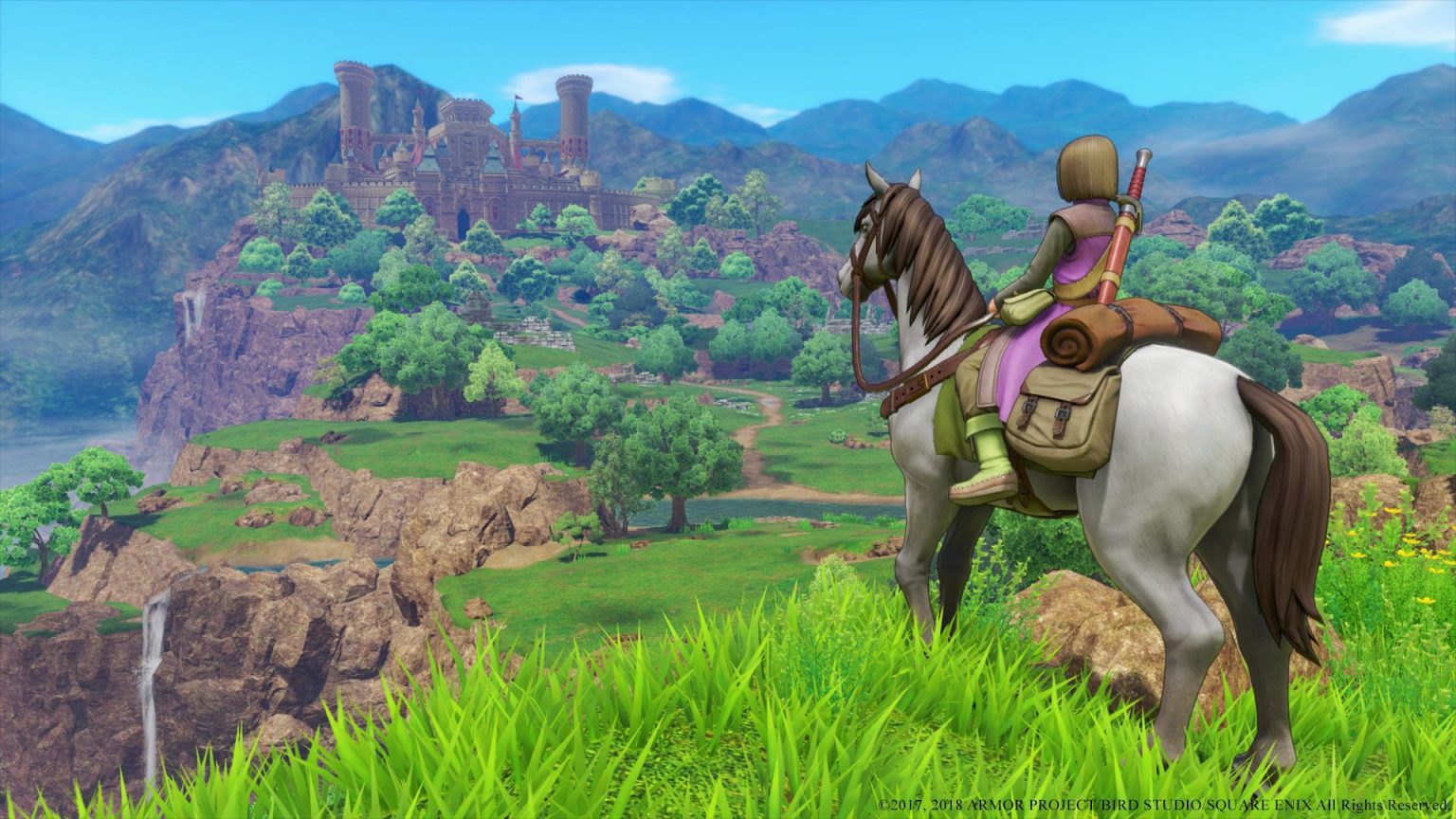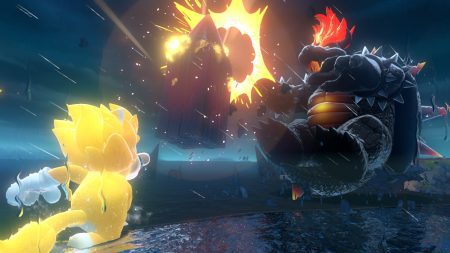Feeling Like a Kid for the First Time
Just a few hours into my first-ever playthrough of Dragon Quest XI (or, more specifically, Dragon Quest XI S: Echoes of an Elusive Age – Definitive Edition, but that’s a mouthful), I felt a sense of comfort and relief, the kind of feel-good sentiments one associates with fond childhood memories. As I embarked on my inaugural quest through Erdrea, I felt like a kid again, battling slimes and recruiting new party members in a classic fantasy adventure just like I have in every console generation.
Here’s the problem, though: I’ve never played a Dragon Quest game before. I didn’t even grow up playing games similar to Dragon Quest. Before 2019, I hadn’t played a classic Japanese RPG all the way through, outside of a few Pokémon games and the first Paper Mario. I shouldn’t feel a shred of nostalgia while playing DQXI, which (apparently) draws heavily on the power of previous series entries, yet somehow I do anyway.
How is this happening? Why is the eleventh game in a series I’ve never touched making me feel this way? Why is it making me nostalgic for an era of games I’ve largely ignored? These questions pop up in my head periodically as I venture forth in DQXI, and I think I’ve figured it out: DQXI makes me nostalgic not for classic JRPGs, but rather a simpler time in gaming overall.
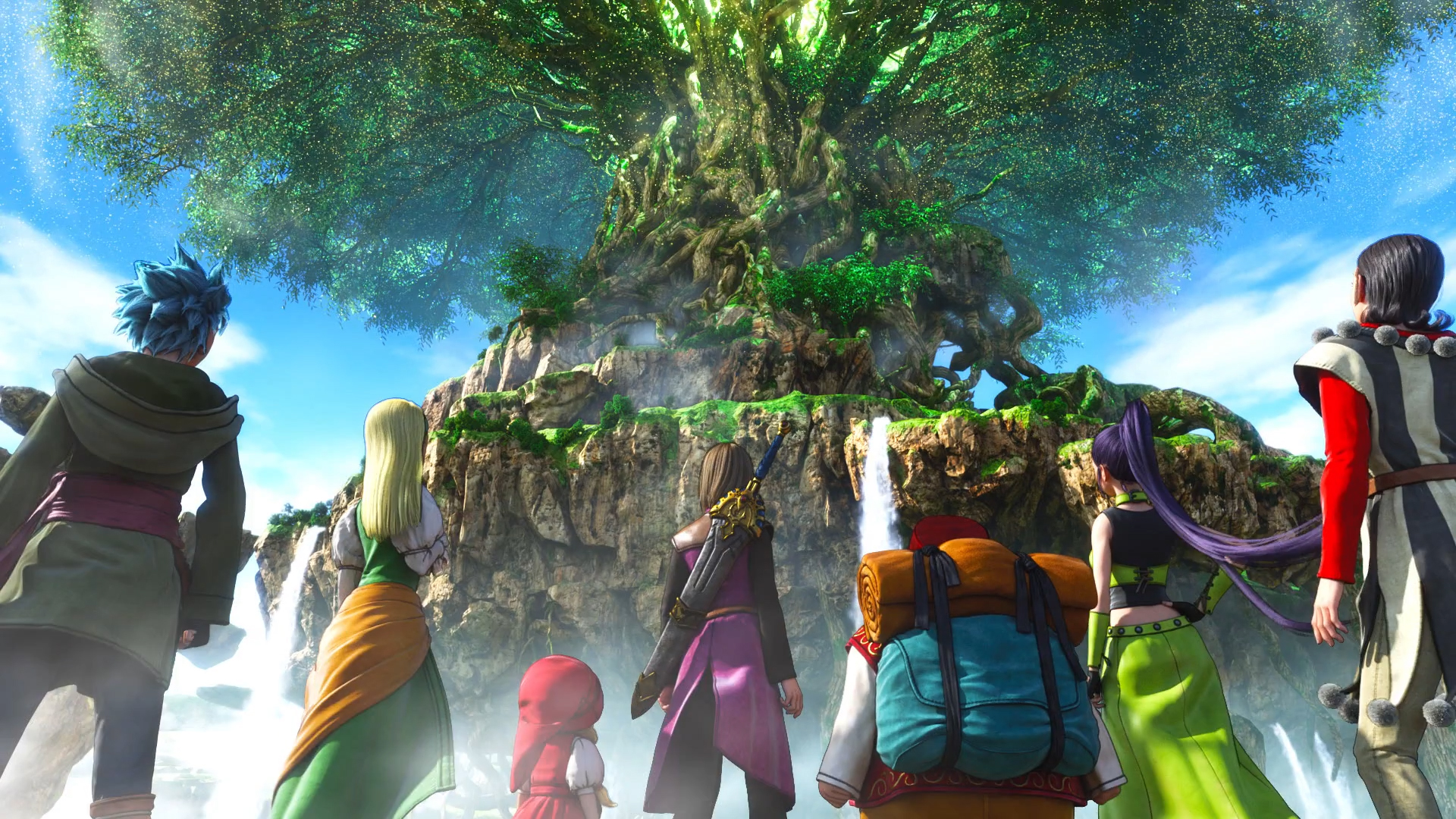
Elusive Echoes
Unlike many of its AAA counterparts, Dragon Quest XI feels no need to reinvent the wheel when it comes to presenting a compelling role-playing experience. Obviously, there are noticeable quality-of-life upgrades from its predecessors (particularly when it comes to random encounters and leveling up), and the visual and sonic presentation are clear improvements from prior entries. But just about everything else feels right out of the 90s: basic turn-based combat, MacGuffin-focused story progression, role-based character building, linear plot, caves full of baddies and treasure chests. DQXI technologically couldn’t have existed in 1993, but conceptually it absolutely could have (you can even play through the whole game with 2D graphics, which I have not done for even a second but still respect its existence).
Beyond even the surface-level RPG tropes, Dragon Quest XI eschews many philosophical changes found in other RPGs of the last decade or so. You can walk into someone’s house and break pots without anyone batting an eye. Putting on a new set of armor increases your defensive stats, but comes with no cosmetic change to the character (with certain exceptions). If you want to save your progress, you can’t simply quick save—you have to locate a save point, often in the form of a church or a statue of an angel.
Your options in combat are simple: attack, defend, spells, abilities, items, flee. Nothing new, fancy, or complicated. In terms of traversing through the world, you can’t simply climb up any wall or mountain. You can’t literally go wherever your eyes can see. Nothing looks even remotely realistic (thanks mostly to Akira Toriyama’s vibrant art style). There are no “immersive” gameplay mechanics, nor are there many verbs beyond “fight,” “walk,” “run,” and “take.”
These qualities (or lack thereof) may connote a level of simplicity, but it’s that very simplicity that makes everything work. Sure, DQXI is an enormous game that takes dozens of hours to complete, but the player is never really overwhelmed by anything. The world isn’t as big as it looks, every major city has a limited number of things to do, the combat doesn’t require a great deal of micro-management, and the story is fairly linear and straightforward. The game is basic at its core, but does not seek to be anything else. If you’re having a good time after hour two, you’ll probably still be having a good time at hour 20 or even hour 40, with little in the way of surprise in between (at least in terms of the minute-to-minute gameplay loop).
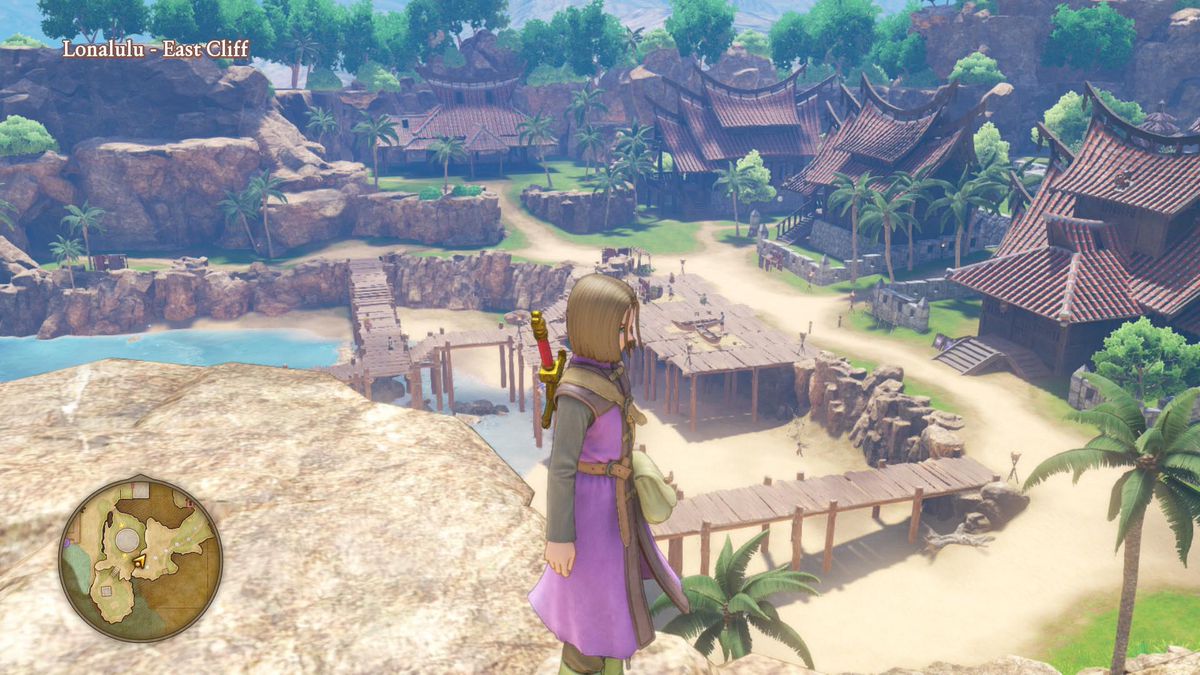
Viewing the Present as the Past
So… why do I feel a sense of nostalgia for this type of game, even though I have little familiarity with it? Simply put, I sometimes miss when even the biggest, most ambitious games weren’t especially complex. I fondly remember an era when some of the hottest titles were remarkably straightforward, even if they still felt years ahead of their time. Grand Theft Auto: Vice City, for example, felt like the next evolution in gaming when I first played it, yet it only took a matter of minutes for me to fully understand how the game worked and what I could do in it. It didn’t have skill trees, games-as-a-service elements, tons of clunky stealth missions, or endless tutorial sections. It had a clear vision (for better or worse), and it wouldn’t have been far-fetched for even the most inexperienced gamer to grab a controller and get it.
Big AAA games today do appear more advanced than their ancestors, but any improvements have come with a litany of complications and additional features that make the simple act of picking up and just playing a damn game all the more difficult. Just before I started Dragon Quest XI, I had played about 20 hours of Assassin’s Creed Valhalla, a remarkably polished action RPG with some of the most strikingly impressive visuals I’ve ever seen. So much of that game, however, is excess and complexity for the sake of excess and complexity. For someone accustomed to this guiding philosophy in AAA games (namely one defined by a cycle of grinding, a broad variety of mission types, and a bland task checklist), that might not be so bad. But for someone who’s never played something like that before, it can feel overwhelming and tedious.
Far too often, modern games assume players know all too well about the medium’s tropes and conventions, making new players often hesitant to try certain kinds of games. What was nice about starting Dragon Quest XI was that it didn’t assume I had any familiarity with the franchise or genre at all. It concisely and succinctly explained what I could do, where I could go, and what I could not do. It also didn’t treat me like a complete novice, either: All information about certain details (e.g., map functions, battle strategies) can be accessed at any time, but these things are never spelled out for the player, and they don’t have to be. Virtually none of the cyclical grind and tedium in AC Valhalla is found in Dragon Quest XI, nor does DQXI bombard the player with tutorial section after tutorial section.
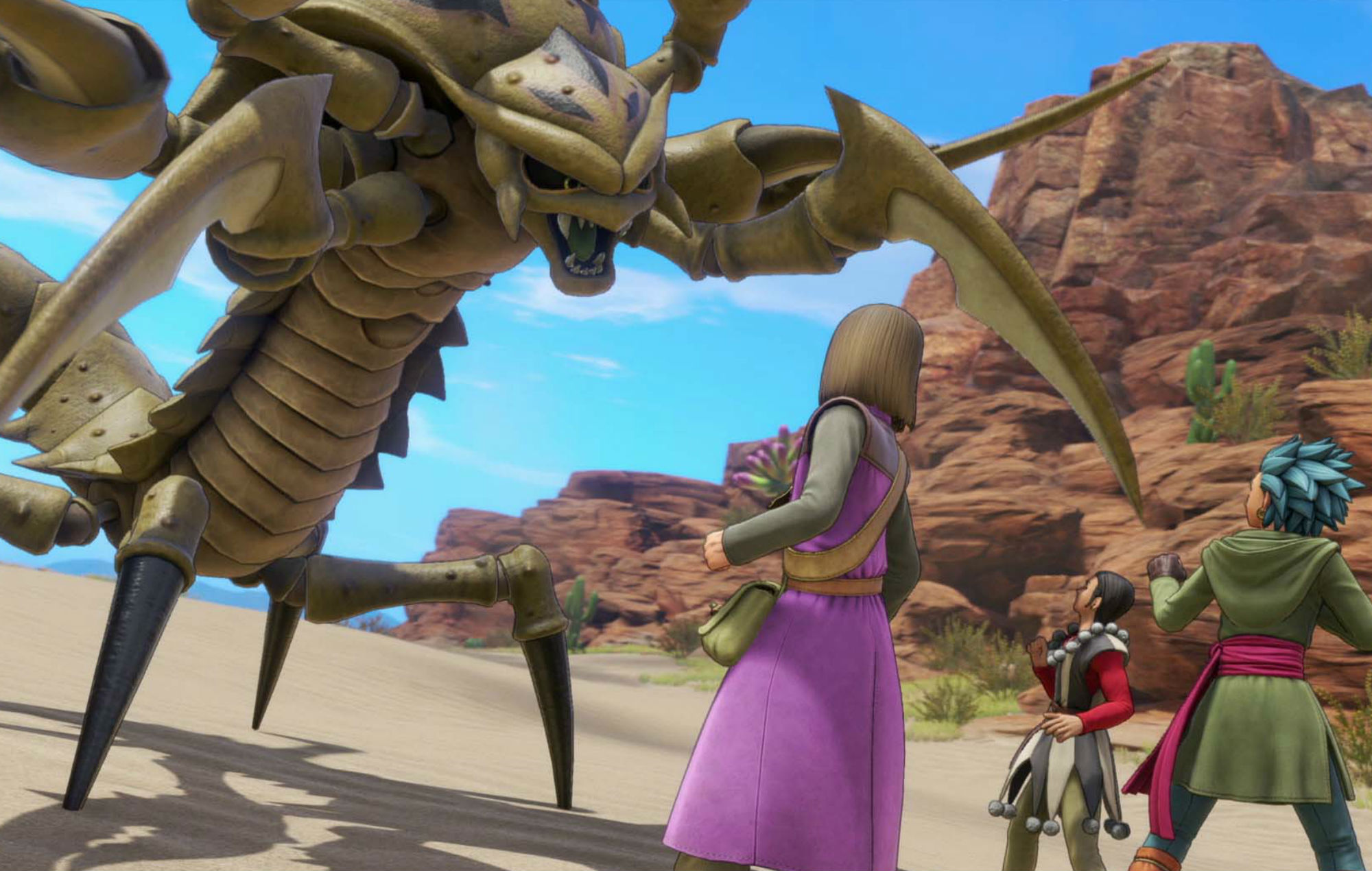
Nostalgia Ain’t What It Used To Be
Nostalgia can be deceptive, since it can make us remember things differently from how they actually were, as best exemplified by how older white Americans talk about and view the 1950s. When it comes to games, I tend to have a saccharine view of the early ’90s, so much so that I often gravitate toward experiences that remind me of that time. When I consider that era, I remember the vibrant colors, jittery 16-bit soundtracks, basic controls, and lack of overtutorializing. What I don’t always remember, however, are the scarcity of save options, random difficulty spikes, and wonky gameplay sequences that couldn’t be patched out.
Despite my lack of familiarity with its predecessors, Dragon Quest XI brings me the good times of that beloved 16-bit era without all the annoying flaws. It presents the kind of experience we all imagined we were playing decades ago, but with enough modern upgrades to feel new. DQXI doesn’t remind me of the early Dragon Quest or Final Fantasy titles (since I haven’t played them), but it reminds me of what it felt like to experience new games for the first time as a kid: often easy to understand, but difficult to master. Assassin’s Creed Valhalla could never.
Sam has been playing video games since his earliest years and has been writing about them since 2016. He’s a big fan of Nintendo games and complaining about The Last of Us Part II. You either agree wholeheartedly with his opinions or despise them. There is no in between.
A lifelong New Yorker, Sam views gaming as far more than a silly little pastime, and hopes though critical analysis and in-depth reviews to better understand the medium's artistic merit.
Twitter: @sam_martinelli.


